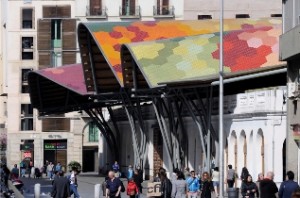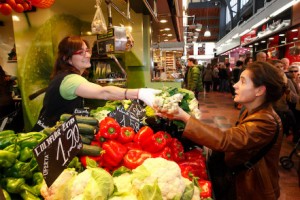URBACT markets
April 24, 2013
Contributors: François Jegou (LE) and Serena Nardin
Workshop: Governance, synergies and local systems / Local markets
It’s a URBACT project with aim to make urban markets a driver of employment and entrepreneurship, urban regeneration, and low carbon economies in cities


Markets are important for cities for many reasons. They offer and create incredible opportunities for social, cultural, and economic wealth:
- They happen in local communities,
- They provide a source of jobs
- They provide a link to local products
- They embrace the way people live and work in communities,
- They are also shop windows for cities and different areas of cities in general
The URBACT Markets is an URBACT project that includes 9 cities from across Europe, amongst them Barcelona, London and Torino, to provide action-orientated knowledge about how to use urban marketplaces to develop low carbon, local supply chains, better and more sustainable urban planning, employment and entrepreneurship. One of the main elements of the URBACT Markets project is the active local participation. The stakeholders have a central role in this process and the partners (the Cities) work with them in order to generate good practices and to choose action lines
Environmental Benefits
- Promote a low carbon economy
- Redeveloping urban areas remodelling of historic buildings for market usage
- Resolving wider city services planning/transportation/mobility issues within cities
- Examining markets’ storage and waste management systems
Economical Benefits
- Generating employment and entrepreneurship
- Fostering capital investment policies
- Creating new business opportunities for stakeholder involved
- Incentivizing tourism
Social Benefits
- Building a community on local food
- Fostering local cohesion
Pro:
- The drafting and approval of a comprehensive Action Plan for our local markets
- The identification and promotion of new best-practice policies, investments and initiatives
- Generation of knowledge about markets that can be ‘exported’ to other similar cities to ours
- Capturing EU and other sources of funding
Markets are a tool for developing architectural and neighbourhood regeneration, job creation and economic dynamism, local supply chains, and they can promote the values required by the sustainable cities of the future (promoting local produce, local mobility, healthy eating, and interaction between farming and city communities and they also create spaces of urban centrality and interaction)
How do you manage what appears to be a complex system of actors/stakeholders? How do you deal with specific local issues that are sometimes deeply rooted in the cultural and historical context?
How can we promote bridges and exchanges between the 2 URBACT projects?